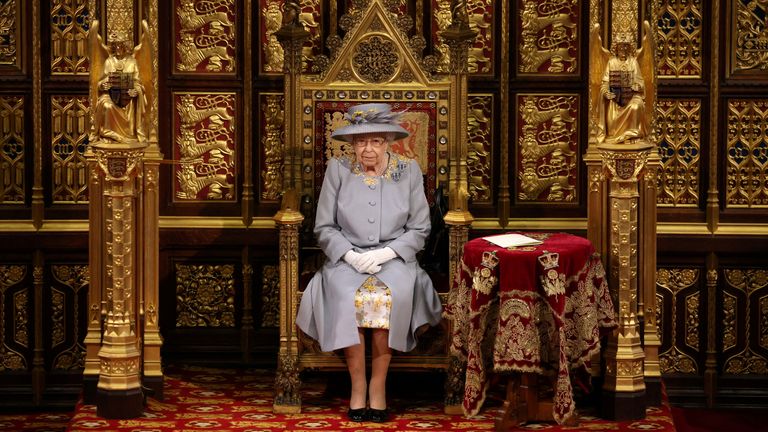[ad_1]
New laws to outlaw guerrilla-style climate protests that have caused misery for the public are being unveiled in a bumper Queen’s Speech.
A new offence of “locking-on”, targeting activists who lock or glue themselves together or to buildings, is planned by Home Secretary Priti Patel.
Her crackdown comes in one of 38 new bills, which also include a bonfire of EU laws in post-Brexit reforms and levelling-up measures to revive town centres.
The legislative agenda is being seen as an attempt by Boris Johnson to relaunch his government after the Conservatives’ heavy losses in last week’s local elections.
Although Labour – hit by “beergate” allegations against Sir Keir Starmer – failed to make major gains in the so-called Red Wall, senior Tories are alarmed by a Liberal Democrat surge in Conservative heartlands.
Jittery Tory MPs will also be hoping the seven expected bills overturning EU laws will produce a “Brexit dividend” in time for the next general election and win the votes of Leave supporters.
For the first time, the Queen’s Speech will be delivered by Prince Charles, after Buckingham Palace announced Her Majesty, who turned 96 last month, is not attending because of her mobility problems.
And as well as new legislation, the prime minister is also promising moves to address the cost of living crisis by creating well paid and highly skilled jobs to ease the burden on families.
These measures could include another reform of business rates by Chancellor Rishi Sunak and allowing workers in the gig economy – employed by the likes of Uber and Deliveroo – to work more hours.
Speaking ahead of the State Opening, the PM said: “This Queen’s Speech will get our country back on track, and I will strive – and this government will strive – night and day to deliver it.
“Because in spite of everything we have been through, we are going to ensure that over the two years we have left in this parliament, we spend every second uniting and levelling up this country, exactly as we said we would.”
On the cost of living, Mr Johnson will say in the Commons debate following the Queen’s Speech: “We will get the country through the aftershocks of COVID, just as we got through COVID, with every ounce of ingenuity and compassion and hard work.
“By urgently pressing on with our mission to create the high wage, high skilled jobs that will drive economic growth across our whole United Kingdom.
“That is the long-term, sustainable solution to ease the burden on families and businesses.”
But Sir Keir Starmer claims a failure to tackle the cost of living crisis and low growth in the Queen’s Speech will mark a major economic failure by the Conservatives.
“Times are tough for working people,” the Labour leader said ahead of the State Opening. “But they are much tougher than they should be.
“Some 12 years of the Conservatives have meant low economic growth, high inflation, and high taxes.
“Because the Tories are not up to the challenge of growing the economy, all those tax hikes aren’t going into improving public services. Never before have people been asked to pay so much for so little.”
Other bills in the government’s programme of legislation, seen as more evidence of an “operation red meat” to shore up the PM’s leadership, include:
• Brexit freedom bills, repealing hundreds of pieces of EU legislation still in UK law;
• Levelling Up and Regeneration Bill, allowing local communities a say on new developments and force the rental of empty high street properties;
• Schools Bill, requiring compulsory attendance registers for schools in England;
• Media Bill, allowing the controversial privatisation of Channel 4, attacked by artists at the Baftas on Sunday;
• Bill of Rights, allowing UK courts to overturn past rulings of the European Court of Human Rights;
• Energy Bill, on building up to eight new nuclear power stations, to increase wind power and solar energy.
The Public Order Bill, according to the home secretary, will prevent highly disruptive tactics causing misery to the hard-working public, costing millions in taxpayers’ money and putting lives at risk.
She says the new law will respond to tactics like “locking-on” to major transport projects and infrastructure which disrupt thousands of journeys and cause costly delays in construction and operations.
Protests by Extinction Rebellion, Insulate Britain and Just Stop Oil have included activists locking or gluing themselves to buildings, sit-down protests blocking roads and bridges and paralysing oil refineries.
“The law-abiding, responsible majority have had enough of anti-social, disruptive protests carried out by a self-indulgent minority who seem to revel in causing mayhem and misery for the rest of us,” said Ms Patel.
“The Public Order Bill will give the police the powers they need to clamp down on this outrageous behaviour and ensure the British public can go about their lives without disruption.”
The law and order crackdown will include:
• New offences of “locking-on” and going equipped to “lock-on” to other people, objects, or buildings will carry a maximum penalty of six months jail, an unlimited fine, or both;
• A new offence of interfering with infrastructure such as airports, railways and printing presses, carrying a maximum sentence of 12 months in prison, an unlimited fine, or both;
• Making it illegal to obstruct the construction of major transport projects, including the HS2 rail network, punishable by up to six months in prison, an unlimited fine or both;
• Extending stop and search powers so police can seize articles and new Serious Disruption Prevention Orders for those who repeatedly inflict criminal disruption on the public.
The bill comes after similar measures in the Police, Crime, Sentencing and Courts Act were thrown out in the House of Lords. Now those measures have been reinstated in the new legislation.
[ad_2]


